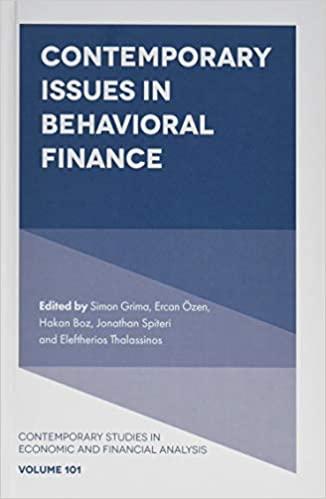Question
A 2-year maturity, 8% coupon bond paying coupons annually is currently selling at par of $1,000.(need full process) (a) If one invests in this bond
A 2-year maturity, 8% coupon bond paying coupons annually is currently selling at par of $1,000.(need full process)
(a) If one invests in this bond until maturity and the reinvestment rate is 5%, what is the realized compound return for this bond investment? Explain whether the yield to maturity for the bond is bigger or smaller than the realized compound return for this bond investment, and why.
An insurance company must make a payment of $19,487 in seven years. The current yield curve in the market is flat at 10% per annum for all maturities. The companys portfolio manager wishes to fully fund this obligation using a two-bond portfolio that is composed of two bonds: (1) a three-year zero-coupon bond and (2) a perpetuity paying annual coupons.
(b) To immunize the companys obligation, what should be the total market value of the three-year zero-coupon bond in the two-bond portfolio now? What is the total face value of the three-year zero-coupon bonds in the two-bond portfolio?
(c) Carefully explain why bond duration is lower for a bond with high coupons than for a bond with low coupons, assuming that all other characteristics of the bonds are the same.
(d) If the yield to maturity of a 10-year zero-coupon bond is up by 50 basis points from 4% to 4.5% immediately after the purchase of this bond, what is the percent change in the value of this bond?
Step by Step Solution
There are 3 Steps involved in it
Step: 1

Get Instant Access to Expert-Tailored Solutions
See step-by-step solutions with expert insights and AI powered tools for academic success
Step: 2

Step: 3

Ace Your Homework with AI
Get the answers you need in no time with our AI-driven, step-by-step assistance
Get Started


